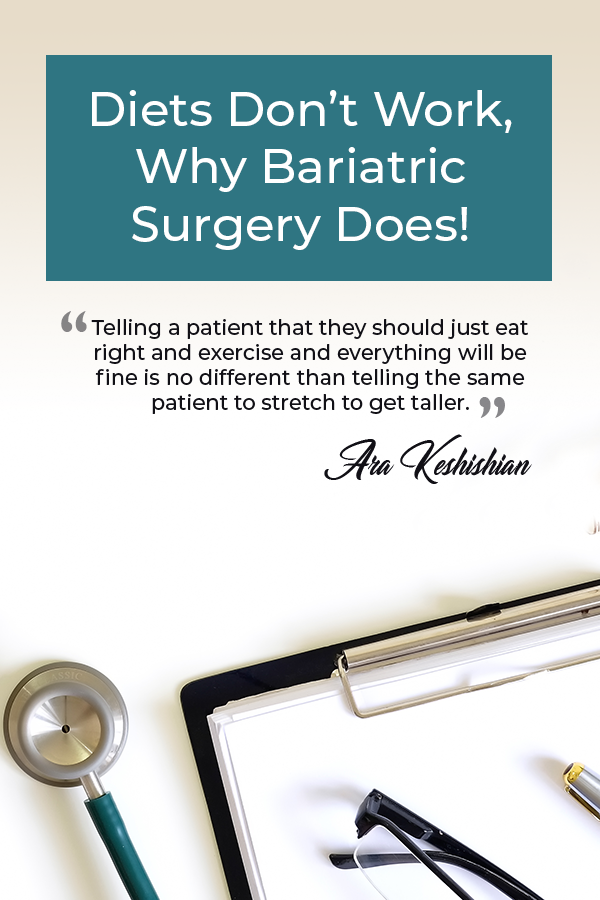
Diets Don’t Work, Why Bariatric Surgery Does!
January 21, 2019“Obesity is not a disease of overeating and lack of exercise.”
I have used this line for years. Telling a patient that they should just eat right and exercise, and everything will be fine is no different than telling the same patient to stretch to get taller. After all, obesity is the disparity between height and weight. Instead of losing weight, why don’t we gain height and be taller? The BMI will be lower the taller we get! As many people have learned from many attempts at losing weight, diets don't work.
I know how crazy this sounds. It is meant to highlight how limited our understanding of obesity has been. We all know individuals that eat not only more but also unhealthy do not exercise, and yet their weight stays unchanged. However, for other individuals, any small deviation from very strict dietary restrictions and strenuous exercise plan will have significant weight gain.
Ninety-five percent of people involved in a weight loss program will regain the weight in 1-5 years.
Fad Dieting and “Yo-Yo” Dieting
 Fad dieting or “yo-yo” dieting can do more harm than good. Some of these fad diets can lead to nutrient deficiencies, eating disorders, or unhealthy eating habits, and unhealthy consequences. They can also disrupt or change the gut microbiome, satisfaction, and hunger cues resulting in overeating or increased fat cell growth. There have been several “natural” dieting supplements that have caused harm or toxicity issues to the people using them. In the long term, these types of diets result in little weight loss and eventual re-gain in most cases.
Fad dieting or “yo-yo” dieting can do more harm than good. Some of these fad diets can lead to nutrient deficiencies, eating disorders, or unhealthy eating habits, and unhealthy consequences. They can also disrupt or change the gut microbiome, satisfaction, and hunger cues resulting in overeating or increased fat cell growth. There have been several “natural” dieting supplements that have caused harm or toxicity issues to the people using them. In the long term, these types of diets result in little weight loss and eventual re-gain in most cases.
Cognitively and neurologically, diets are difficult because once you’ve decided to diet, you become acutely aware of the foods you are trying to avoid. Your cravings for the things you “can’t” have may increase just because you’ve deemed them off-limits. The reward value and desirability of the off-limits foods goes up.
Genetics and the Endocrine System
The largest contributors to why diets don’t work are genetics and the endocrine system.
Obesity is a multifactorial condition where one's genetics and endocrine regulatory command have significantly more control over weight regulation than caloric intake and expenditure. This is not to dismiss or negate the significance of healthy dietary choices and the importance of daily exercise. Both exercise and healthy dietary choices have significant health benefits and can improve overall well-being.
Diet plans are similar to dyeing hair. When a patient stops dyeing their hair, the genetically dictated color shows. Dieting temporarily lowers the genetically and physiologically based set point for the energy equilibrium. Once the dieting stops, the weight returns. Diets do not fail. Patients do not fail. It is unrealistic to expect to keep weight off by going on a diet for a period of time any more or less than having blue hair after dying your hair once.
Processed Food and Antibiotics
There are also other insidious factors that play a role in our epidemic of obesity. Processed food, the presence of growth hormones, genetically engineered food, and antibiotics may all play a role over time by changing how our body responds to energy intake. Our understanding of energy regulation has led to a paradigm shift in how obesity should be treated. Caloric restriction and sustained activity may be useful in minimal weight reduction over time.
Weight loss surgical procedures limit the volume of the food consumed, limits absorption or both. The procedure(s) that accomplish both are the most successful of all procedures. It is by the means of limiting absorption, that weight loss surgical procedures demonstrate sustained long-term results.
There is also some evidence in research that bariatric surgical procedures have some effect on the biochemical and physiological pathways, especially on patients with metabolic syndrome, namely, Type 2 Diabetes. It is important to not generalize the outcomes of all weight loss surgical procedures. Let’s not forget how the adjustable gastric band was promised as a cure-all, safe procedure 10 years ago, and now its long term complications are coming to light. Similarly, we all need to be very skeptical and careful in embracing new procedures and devices that have not been proven in short or long term weight loss and health improvement.
Procedures, such as the Duodenal Switch, that incorporate a restrictive procedure (sleeve gastrectomy) and mechanisms to reduce absorption (creating alimentary, common, and biliopancreatic limbs) produce the best long term success of all surgical procedures. These procedures, directly or indirectly, also result in changes in regulatory mechanisms and hormones such as Ghrelin, Leptin, and possibly other endocrine regulators.
We have only started scratching the surface of the regulatory pathways, gut microbiome, and hormones that play a role in energy equilibrium and, thus, our weight. Diets, medications, and supplements have not been able to affect any of the known regulatory mechanisms in a meaningful way. Dieting doesn’t work long term for sustainable weight loss maintenance.

 | ABOUT THE AUTHOR Dr. Ara Keshishian is Director and Surgeon at Central Valley Bariatrics. He has performed more than 2,000 Duodenal Switch procedures and 500+ revisions from other procedures such as RNY, Lap-Band & VSG to the DS since 1999. He has published several research articles on weight loss surgery topics.Read more articles from Dr. Keshishian! |



